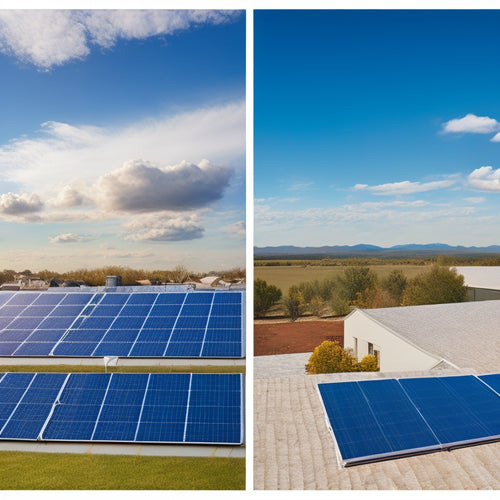
7 Best Automation Tools for Off-Grid Home Efficiency
Share
You're looking to upgrade your off-grid home with automation tools for maximum efficiency. You can start by implementing an energy monitoring system to track your energy production and consumption in real-time. Then, optimize your lighting with smart LED bulbs and automated scheduling. Don't forget to install automated water conservation systems and optimize your climate control strategies. Efficient appliance automation tools and seamless integration with renewable energy systems can also make a big impact. To take your off-grid home to the next level, explore these cutting-edge tools and discover how they can work together in harmony to create the ultimate off-grid living experience.
Key Takeaways
• Energy monitoring systems provide real-time tracking of energy production and consumption for optimal off-grid home efficiency.
• Automated lighting schedules and smart lighting options like LED bulbs and solar lamps minimize energy waste.
• Efficient appliance automation tools optimize energy consumption and reduce waste in off-grid homes.
• Climate control strategies, such as thermal massing and passive ventilation, regulate indoor temperatures efficiently.
• Centralized dashboards integrate with voice assistants for seamless monitoring and control of energy and water systems.
Energy Monitoring Made Easy
By installing an energy monitoring system, you can track your off-grid home's energy production and consumption in real-time, enabling data-driven decisions to optimize your system's performance. With real-time tracking, you'll gain a deeper understanding of your energy usage patterns, identifying areas of importance and opportunities for improvement. This insight allows you to make adjustments to your energy generation and consumption habits, reducing waste and maximizing your system's potential.
Energy auditing is an essential aspect of energy monitoring. By analyzing your energy usage data, you can identify which appliances and systems are consuming the most energy, and make informed decisions to upgrade or replace them with more efficient alternatives. This process helps you optimize your energy system, reduce your carbon footprint, and lower your energy bills.
With an energy monitoring system, you'll be empowered to take control of your energy usage, making your off-grid home more efficient, sustainable, and cost-effective. By leveraging the power of real-time tracking and energy auditing, you'll be well on your way to achieving energy independence.
Smart Lighting for Off-Grid Homes
As you design your off-grid home's lighting system, you're likely looking for ways to minimize energy consumption while maintaining a comfortable living space.
You'll want to explore energy-efficient lighting options, such as LEDs and solar-powered lights, that reduce your reliance on non-renewable energy sources.
Energy-Efficient Lighting Options
When designing your off-grid home, selecting energy-efficient lighting options is important, and smart lighting solutions can greatly reduce your energy consumption.
You'll want to opt for LED light bulbs, which use considerably less energy than traditional incandescent bulbs. For example, an LED light bulb can use up to 90% less energy than a traditional light bulb while providing the same level of brightness.
Another energy-efficient option is solar lamps, which harness the power of the sun to provide light. Solar lamps are a great choice for off-grid homes, as they eliminate the need for wiring and can be easily installed in areas where traditional lighting may not be feasible.
Additionally, solar lamps can be charged during the day and provide light at night, making them an ideal solution for off-grid homes.
Automated Lighting Schedules
You can take your energy-efficient lighting to the next level by implementing automated lighting schedules, which allow you to customize your lighting usage to fit your unique off-grid lifestyle. With automated lighting schedules, you can program your lights to turn on and off at specific times, adjusting to your daily routines and preferences.
This feature is especially valuable in off-grid homes where energy conservation is essential. For instance, you can set your lights to turn on gradually, simulating a sunrise, gently waking you up in the morning. As you move around your home, motion sensors can detect your presence, automatically switching on lights in the areas you're occupying. This not only enhances safety but also reduces energy waste.
Automated Water Conservation Systems
When it comes to conserving water in your off-grid home, you're likely aware of the importance of minimizing waste.
That's where automated water conservation systems come in, and you'll be interested to know that smart leak detection and efficient water metering are key components of these systems.
Smart Leak Detection
Smart leak detection systems utilize advanced sensors and machine learning algorithms to identify potential water waste and alert homeowners to even the slightest anomalies in their plumbing system. As you consider implementing automated water conservation systems in your off-grid home, smart leak detection is an essential component to prioritize.
By conducting regular pipe inspections, you can identify vulnerabilities in your plumbing system, allowing you to address potential issues before they escalate into costly water wastage. With smart leak detection, you'll receive real-time alerts when even the slightest leaks or anomalies are detected, enabling you to take prompt action to prevent water waste.
This proactive approach not only saves you money on your water bill but also helps reduce your environmental footprint. By incorporating smart leak detection into your automated water conservation system, you'll enjoy peace of mind knowing your home is operating efficiently and sustainably.
Efficient Water Metering
By monitoring your water usage in real-time, efficient water metering systems play a vital role in identifying areas of inefficiency and provide valuable insights to optimize your automated water conservation system.
As you work to reduce your water footprint, these systems play an important role in pinpointing hidden leaks, detecting anomalies, and optimizing water flow.
Climate Control for Off-Grid Living
You'll need to carefully regulate indoor temperatures to maintain a comfortable and energy-efficient off-grid home, especially in extreme climates. Thermal massing is an essential aspect of climate control, where materials with high thermal mass, such as concrete or adobe, absorb and release heat slowly, regulating indoor temperatures.
This passive approach reduces the need for mechanical heating and cooling systems, saving energy and reducing your carbon footprint.
Passive ventilation is another key strategy for off-grid climate control. By strategically designing your home's layout and orientation, you can harness natural ventilation to regulate indoor temperatures. This can be achieved through careful placement of windows, doors, and clerestory windows to maximize natural airflow and reduce the need for mechanical ventilation systems.
Efficient Appliance Automation Tools
Efficient appliances, paired with automation tools, can greatly reduce your off-grid home's energy consumption, allowing you to fine-tune your energy usage and optimize your system's performance. By integrating your appliances with automation tools, you can create a harmonious and efficient system that works in tandem to minimize energy waste.
One effective way to achieve this is through Appliance Integration. This involves connecting your appliances to a central hub, allowing you to monitor and control their energy usage remotely. This level of control enables you to identify energy-hungry appliances and make adjustments to optimize their performance.
Smart Plugs are another valuable tool in your automation arsenal. These intelligent outlets allow you to control individual appliances, scheduling their operation and monitoring their energy usage in real-time. This granular control enables you to identify areas of inefficiency and make data-driven decisions to optimize your system's performance.
Renewable Energy System Integrators
With a well-designed renewable energy system, integrators play an essential role in ensuring seamless communication between your off-grid home's various components, from solar panels and wind turbines to energy storage systems and inverters. They act as the 'orchestra conductor,' harmonizing the performance of each component to maximize energy efficiency and minimize waste.
In essence, integrators serve as the bridge between your renewable energy system's hardware and software. They design and implement the system architecture, ensuring that each component works in tandem to provide a reliable and efficient energy supply.
Some key benefits of working with renewable energy system integrators include:
-
Customized system design: They assess your energy needs and design a system tailored to your off-grid home's unique requirements.
-
Industry partnerships: Integrators often have established relationships with manufacturers, allowing them to source high-quality components at competitive prices.
-
Optimized system performance: By ensuring seamless communication between components, integrators can optimize your system's performance, reducing energy waste and maximizing efficiency.
Seamless Home Automation Hubs
How do you envision controlling and monitoring your off-grid home's various systems, from renewable energy generation to water management, from a single, intuitive interface? A seamless home automation hub is the answer. With a centralized dashboard, you can effortlessly monitor and control your off-grid home's systems, ensuring maximum efficiency and minimizing waste.
Imagine being able to adjust your solar panel's angle or monitor your water harvesting system's performance with just a few taps on your tablet or smartphone. Voice assistants, like Alexa or Google Assistant, can also be integrated, allowing you to control your home's systems with simple voice commands.
This level of automation and control not only enhances your off-grid lifestyle but also provides peace of mind, knowing that your home is running smoothly and efficiently. By integrating your systems into a single, user-friendly interface, you can focus on what matters most – enjoying your off-grid home and the freedom it provides.
Frequently Asked Questions
Can Automation Tools Be Integrated With Existing Off-Grid Systems?
You can seamlessly integrate automation tools with your existing off-grid systems, leveraging system integration to optimize energy harvesting and maximize efficiency, as long as you choose compatible components and follow proper installation protocols.
Are Smart Home Devices Compatible With Alternative Energy Sources?
As you step into your off-grid haven, you wonder: can your smart home devices harmonize with alternative energy sources? Fortunately, yes, many devices are designed for Energy Harvesting and seamless Renewable Integration, ensuring your eco-friendly abode hums in perfect harmony.
How Do Automation Tools Affect the Overall Cost of Off-Grid Living?
When you invest in automation tools, you'll notice significant energy savings and cost optimization, reducing your overall cost of off-grid living by up to 30%, allowing you to enjoy the freedom of off-grid living without breaking the bank.
Can Automation Tools Be Controlled Remotely via Smartphone Apps?
You can control your off-grid home's automation tools remotely via smartphone apps, ensuring seamless remote access, with robust app security, voice control, and automated routines that simplify your life, wherever you are.
Do Automation Tools Require Professional Installation or DIY Friendly?
When considering DIY-friendliness, you'll find that automation tools vary in system complexity, affecting user experience. While some systems are plug-and-play, others require professional installation, so make sure to research and choose tools that fit your comfort level.
Related Posts
-

3 Best State and Local Solar Incentives USA
You can greatly reduce your energy dependence and save thousands of dollars by taking advantage of the top state and ...
-

5 Ways Bike Sharing Boosts Urban Sustainability
As you explore bike-sharing options, you'll discover five ways it boosts urban sustainability. By reducing congestion...
-

Tracking Solar Panels Vs Fixed Panels Cost Savings
When considering solar panel options, you'll want to weigh the cost savings of tracking solar panels versus fixed pan...


